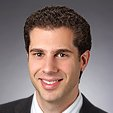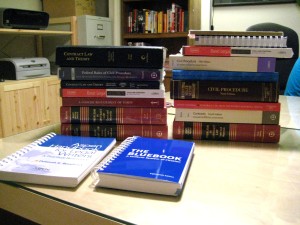
Law school, medical school, graduate school, or something else. That’s the way a lot of American non-engineering college students think about their future choices. Jason Gross chose the law school route. He practiced for years as a successful litigation attorney but then decided he wanted to work in a new area. It’s a daunting thought to change fields after putting so much time into school and developing a specialization. So if you’re a lawyer who went to law school and has been working, what do you do if you want to change careers? This week we interview Jason Gross who went from being a litigation attorney to working at UCLA in development. He’ll tell you about his journey and what you can do if you’re thinking about switching careers.
BlackBoxPhD 3-Point Checklist: How to Make a Smooth Career Change
- When considering a career change, try to focus on the skills you have or could easily obtain. Having to learn a whole new set of skills from scratch could make the transition much more challenging.
- Seek out mentors. If possible, find others who have made the same change and can mentor you through the transition.
- Rather than focusing on a specific job title, focus instead on the type of work that you would find meaningful. For example, ask yourself if you would like to work with children, have a job that involves a lot of travel, or work with numbers.
Hey Jason, can you tell us your background and what you’re doing now?
I received my undergraduate degree from UCLA and J.D. from UC Hastings College of the Law. I worked for a number of years as a litigator, with a focus on entertainment and intellectual property matters. Last year, I made the transition to development with UCLA because I wanted to use my skills as a litigator for what I find to be more fulfilling work. Now I have the pleasure of raising funds for UCLA Health Sciences to support medical research, patient programs, and medical scholarships, among other worthy causes.
Can you talk more about what you’re currently doing at UCLA?
I serve as the Director of Gift Planning for UCLA Health Sciences Development. Gift planning is a niche area of development that involves deferred gifts such as bequests, charitable gift annuities, and charitable beneficiary designations, but also includes gifts of property, such as securities and real estate. It has a financial planning component to it, as planned gifts have various tax savings and consequences associated with them.
Do you use the same skills as in your previous work as a litigator, or is it completely different?
There is no better preparation I could have had for my current work than my prior work as a litigator. Not a day goes by where I don’t put most of my litigation skills to work: namely, to be both an effective communicator and listener, to synthesize complex topics into more digestible concepts, to be persuasive, to implement different strategies depending on the donor’s abilities and goals, etc.
When you went to law school did you think you’d be practicing law your whole life? What made you realize you  wanted to switch?
wanted to switch?
I never had any intention of going to law school until my senior year of college, when, as an avid music fan, I found myself following closely Napster’s legal battles with the record industry. Even after law school, I loved entertainment law and knew I wanted to be involved in the field, but not necessarily as a litigator. There were elements of litigation that I found very enjoyable, but after a few years, I started seeking more meaningful work. I realized I wanted to work in the nonprofit sector, and made the switch after I met a number of attorneys who had transitioned to gift planning and were absolutely thrilled about the work they do.
What was it like switching? For a lot of people that would be really tough leaving a safe position and moving into a new unknown area. Was it for you?
I found the transition very seamless, as UCLA provided me with all the training and resources I needed to be successful. Additionally, my litigation skills were largely transferable, so the learning curve on that front was very mild. Most importantly, I attended UCLA during my undergraduate studies, so joining the Bruin Family was essentially a homecoming for me!
What insights has your experience given you about work, life, and what’s important?
I’ve learned that inertia is easy and making extraordinary changes in your career or any other significant area in your life can be daunting. But if you are willing to take risks, the rewards are well worth it. Because I took a risk, I now find myself working in a field that brings me more joy than I ever believed I could find in my career. It’s important to note that I’m not talking about a blind risk, but rather a calculated risk: I had spoken with numerous attorneys who had made this transition before me and were able to guide me through this transition. To this day, I still rely on their guidance.

Pingback: Kata Kata Ucapan Lebaran Idul Fitri 2017/2018
Pingback: 123movies
Pingback: daftar cpns 2017
Pingback: vitro pharmacology
Pingback: Eavestrough Cleaning
Pingback: how to make money with a iphone
Pingback: must watch
Pingback: walk in closet designs
Pingback: satta matka
Pingback: العراق
Pingback: Engineer Aws Alkhazraji4
Pingback: rechenzentrum deutschland
Pingback: university of diyala Aws Alkhazraji
Pingback: pengumuman cpns 2019 lipi
Pingback: diyala engineer
Pingback: lisboa informática
Pingback: wedding event management company in hyderabad
Pingback: آنتی ویروس بیت دیفندر
Pingback: warehouse for rent
Pingback: UK Chat
Pingback: 蜘蛛
Pingback: Ambika Ahuja Jaipur Escorts
Pingback: XXX JAIPUR ESCORTS ALIYA SINHA
Pingback: XXX JAIPUR ESCORTS MODEL DRISHYA
Pingback: Jiya Malik High Profile Jaipur Escorts Model
Pingback: XXX FUN WITH JAIPUR ESCORTS PUJA KAUR
Pingback: XXX BANGALORE ESCORTS ROZLYN MODEL
Pingback: Selly Arora Independent Bangalore Escorts
Pingback: Enjoy With Jaipur Escorts Tanisha Walia
Pingback: Bristy Roy Independent Bangalore Escorts
Pingback: Bangalore Escorts Sneha Despandey
Pingback: IND ADME Studies
Pingback: biopharmaceutical assessment in rodents
Pingback: Elizabeth Bay Locksmith
Pingback: diyala sciences
Pingback: aqueous testosterone
Pingback: gypsy
Pingback: The Sims 4 Seasons Free Game
Pingback: Ruby Sen Kolkata Independent Escorts
Pingback: Diana Diaz Goa Independent Escorts Services
Pingback: Diksha Arya Independent Escorts Services in Kolkata
Pingback: Devika Kakkar Goa Escorts Services
Pingback: Rebecca Desuza Goa Independent Escorts Services
Pingback: Yamini Mittal Independent Escorts Services in Goa
Pingback: Simmi Mittal Kolkata Escorts Services
Pingback: Kolkata Escorts Services Ragini Mehta
Pingback: Navya Sharma Independent Kolkata Escorts Services
Pingback: Elisha Roy Goa Independent Escorts Services
Pingback: Alisha Oberoi Kolkata Escorts Services
Pingback: Divya Arora Goa Independent Escorts Services
Pingback: Simran Batra Independent Escorts in Kolkata
Pingback: Ashna Ahuja Escorts Services in Kolkata
Pingback: Sofia Desai Escorts Services in Goa
Pingback: Goa Escorts Services Drishti Goyal
Pingback: Mayra Khan Escorts Services in Kolkata
Pingback: buy anabol
Pingback: Sruthi Pathak Escorts in Bangalore
Pingback: Ambika Ahuja Jaipur Escorts Services
Pingback: Sruthi Pathak Bangalore Female Escorts
Pingback: Sruthi Pathak Bangalore Escorts Services
Pingback: Trully Independent Bangalore Escorts Services
Pingback: Trully Independent Bangalore Escorts
Pingback: Fiza Khan Kolkata Independent Call Girls Services
Pingback: Ruchika Roy Kolkata Escorts Call Girls Services
Pingback: Kolkata Escorts
Pingback: Escorts in Kolkata
Pingback: Kolkata Independent Escorts
Pingback: Fiza Khan Kolkata Independent Escorts Call Girls Services
Pingback: Fiza Khan Kolkata Call Girls Escorts Services
Pingback: Diksha Arya Kolkata Escorts Call Girls Services
Pingback: assistência informática
Pingback: Cheap
Pingback: Nidika Offer Call Girls in Bangalore
Pingback: Hyderabad Escorts Call Girls Services
Pingback: Pune Escorts Services Call Girls
Pingback: Bangalore Cheap Escorts Sevices
Pingback: Goa Escorts Call Girls Services
Pingback: Bangalore Escorts Services
Pingback: generic ed pills
Pingback: propecia online
Pingback: cbd oil
Pingback: 500 hemp cbd oil for sale
Pingback: hemp oil cbd 500mg for sale
Pingback: erectile dysfunction pills
Pingback: domeebcu
Pingback: how long does azithromycin stay in your system
Pingback: oral amoxicillin
Pingback: lasixonline
Pingback: azithromycin 1000mg tablets
Pingback: ivermectin 3mg dose
Pingback: albuterol online canada
Pingback: synthroid or armour
Pingback: propecia best price
Pingback: discount neurontin
Pingback: metformin pcos
Pingback: plaquenil allergic reaction
Pingback: buy amoxil 500mg uk
Pingback: buy lasix 100mg
Pingback: neurontin tablets
Pingback: plaquenil otc
Pingback: 1.5 prednisone
Pingback: priligy online usa
Pingback: 800mg modafinil
Pingback: cheap stromectol
Pingback: ventolin 108 mcg
Pingback: zithromax 500mg tab
Pingback: lasix 40mg
Pingback: plaquenil singapore
Pingback: ivermectin 0.5%
Pingback: azithromycin price
Pingback: stromectol
Pingback: nolvadex tabs
Pingback: Anonymous
Pingback: how much does ivermectin cost
Pingback: buy ivermectin online
Pingback: order prednisone 10mg online cheap
Pingback: tadalafil prices
Pingback: generic ivermectin
Pingback: ivermectin 18mg
Pingback: ivermectina 6mg for sale
Pingback: cheap sildenafil online in usa
Pingback: generic name for ivermectin
Pingback: prednisone 20mg tablet side effects
Pingback: molnupiravir pronunciation
Pingback: wild casino
Pingback: side effects prednisone
Pingback: who makes ivermectin
Pingback: casino play real money usa
Pingback: ivermectin gold
Pingback: ivermectin price
Pingback: ivermectin buy australia
Pingback: ivermectine et covid
Pingback: ivermectin for rosacea
Pingback: best casino online
Pingback: stromectol 6mg
Pingback: ivermectin cost in usa
Pingback: ivermectin 50ml
Pingback: how to buy propecia in canada
Pingback: where to buy generic propecia forum
Pingback: call girls in lucknow
Pingback: russian escorts in delhi
Pingback: ghaziabad escorts
Pingback: ghaziabad escorts
Pingback: escrrr
Pingback: indre
Pingback: lcknw
Pingback: cgl
Pingback: noida escorts
Pingback: call girls in dehradun
Pingback: cg
Pingback: cgs
Pingback: cgls
Pingback: hdwre
Pingback: cg mussorie
Pingback: Dehradun Escorts